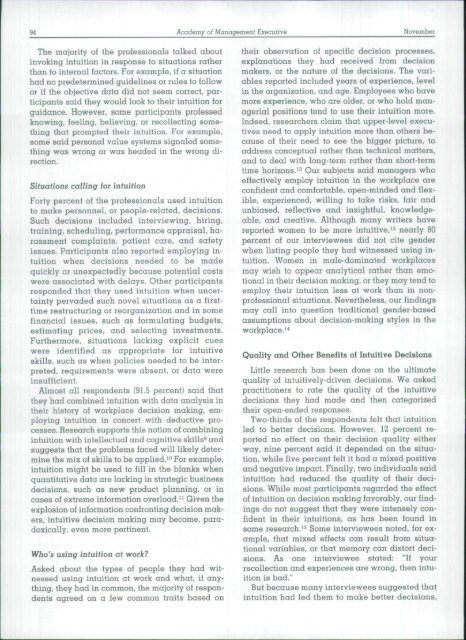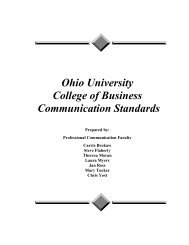Taking the mystery out of intuitive decision making
Taking the mystery out of intuitive decision making
Taking the mystery out of intuitive decision making
You also want an ePaper? Increase the reach of your titles
YUMPU automatically turns print PDFs into web optimized ePapers that Google loves.
94 Academy <strong>of</strong> Management Executive November<br />
The majority <strong>of</strong> <strong>the</strong> pr<strong>of</strong>essionals talked ab<strong>out</strong><br />
invoking intuition in response to situations ra<strong>the</strong>r<br />
than to internal factors. For example, if a situation<br />
had no predetermined guidelines or rules to follow<br />
or if <strong>the</strong> objective data did not seem correct, participants<br />
said <strong>the</strong>y would look to <strong>the</strong>ir intuition for<br />
guidance. However, some participants pr<strong>of</strong>essed<br />
knowing, feeling, believing, or recollecting something<br />
that prompted <strong>the</strong>ir intuition. For example,<br />
some said personal value systems signaled something<br />
was wrong or was headed in <strong>the</strong> wrong direction.<br />
Situations caiJing for infuifion<br />
Forty percent <strong>of</strong> <strong>the</strong> pr<strong>of</strong>essionals used intuition<br />
to make personnel, or people-related, <strong>decision</strong>s.<br />
Such <strong>decision</strong>s included interviewing, hiring,<br />
training, scheduling, performance appraisal, harassment<br />
complaints, patient care, and safety<br />
issues. Participants also reported employing intuition<br />
when <strong>decision</strong>s needed to be made<br />
quickly or unexpectedly because potential costs<br />
were associated with delays. O<strong>the</strong>r participants<br />
responded that <strong>the</strong>y used intuition when uncertainty<br />
pervaded such novel situations as a firsttime<br />
restructuring or reorganization and in some<br />
financial issues, such as formulating budgets,<br />
estimating prices, and selecting investments.<br />
Fur<strong>the</strong>rmore, situations lacking explicit cues<br />
were identified as appropriate for <strong>intuitive</strong><br />
skills, such as when policies needed to be interpreted,<br />
requirements were absent, or data were<br />
insufficient.<br />
Almost all respondents (91.5 percent) said that<br />
<strong>the</strong>y had combined intuition with data analysis in<br />
<strong>the</strong>ir history <strong>of</strong> workplace <strong>decision</strong> <strong>making</strong>, employing<br />
intuition in concert with deductive processes.<br />
Research supports this notion <strong>of</strong> combining<br />
intuition with intellectual and cognitive skills^ and<br />
suggests that <strong>the</strong> problems faced will likely determine<br />
<strong>the</strong> mix <strong>of</strong> skills to be applied.'° For example,<br />
intuition might be used to fill in <strong>the</strong> blanks when<br />
quantitative data are lacking in strategic business<br />
<strong>decision</strong>s, such as new product planning, or in<br />
cases <strong>of</strong> extreme information overload." Given <strong>the</strong><br />
explosion <strong>of</strong> information confronting <strong>decision</strong> makers,<br />
<strong>intuitive</strong> <strong>decision</strong> <strong>making</strong> may become, paradoxically,<br />
even more pertinent.<br />
Who's using intuition at work?<br />
Asked ab<strong>out</strong> <strong>the</strong> types <strong>of</strong> people <strong>the</strong>y had witnessed<br />
using intuition at work and what, if anything,<br />
<strong>the</strong>y had in common, <strong>the</strong> majority <strong>of</strong> respondents<br />
agreed on a few common traits based on<br />
<strong>the</strong>ir observation <strong>of</strong> specific <strong>decision</strong> processes,<br />
explanations <strong>the</strong>y had received from <strong>decision</strong><br />
makers, or <strong>the</strong> nature <strong>of</strong> <strong>the</strong> <strong>decision</strong>s. The variables<br />
reported included years <strong>of</strong> experience, level<br />
in <strong>the</strong> organization, and age. Employees who have<br />
more experience, who are older, or who hold managerial<br />
positions tend to use <strong>the</strong>ir intuition more.<br />
Indeed, researchers claim that upper-level executives<br />
need to apply intuition more than o<strong>the</strong>rs because<br />
<strong>of</strong> <strong>the</strong>ir need to see <strong>the</strong> bigger picture, to<br />
address conceptual ra<strong>the</strong>r than technical matters,<br />
and to deal with long-term ra<strong>the</strong>r than short-term<br />
time horizons.'2 Our subjects said managers who<br />
effectively employ intuition in <strong>the</strong> workplace are<br />
confident and comfortable, open-minded and flexible,<br />
experienced, willing to take risks, fair and<br />
unbiased, reflective and insightful, knowledgeable,<br />
and creative. Although many writers have<br />
reported women to be more <strong>intuitive</strong>,'^ nearly 80<br />
percent <strong>of</strong> our interviewees did not cite gender<br />
when listing people <strong>the</strong>y had witnessed using intuition.<br />
Women in male-dominated workplaces<br />
may wish to appear analytical ra<strong>the</strong>r than emotional<br />
in <strong>the</strong>ir <strong>decision</strong> <strong>making</strong>, or <strong>the</strong>y may tend to<br />
employ <strong>the</strong>ir intuition less at work than in nonpr<strong>of</strong>essional<br />
situations. Never<strong>the</strong>less, our findings<br />
may call into question traditional gender-based<br />
assumptions ab<strong>out</strong> <strong>decision</strong>-<strong>making</strong> styles in <strong>the</strong><br />
workplace.'•*<br />
Quality and O<strong>the</strong>r Benefits <strong>of</strong> Intuitive Decisions<br />
Little research has been done on <strong>the</strong> ultimate<br />
quality <strong>of</strong> <strong>intuitive</strong>ly-driven <strong>decision</strong>s. We asked<br />
practitioners to rate <strong>the</strong> quality <strong>of</strong> <strong>the</strong> <strong>intuitive</strong><br />
<strong>decision</strong>s <strong>the</strong>y had made and <strong>the</strong>n categorized<br />
<strong>the</strong>ir open-ended responses.<br />
Two-thirds <strong>of</strong> <strong>the</strong> respondents felt that intuition<br />
led to better <strong>decision</strong>s. However, 12 percent reported<br />
no effect on <strong>the</strong>ir <strong>decision</strong> quality ei<strong>the</strong>r<br />
way, nine percent said it depended on <strong>the</strong> situation,<br />
while five percent felt it had a mixed positive<br />
and negative impact. Finally, two individuals said<br />
intuition had reduced <strong>the</strong> quality <strong>of</strong> <strong>the</strong>ir <strong>decision</strong>s.<br />
While most participants regarded <strong>the</strong> effect<br />
<strong>of</strong> intuition on <strong>decision</strong> <strong>making</strong> favorably, our findings<br />
do not suggest that <strong>the</strong>y were intensely confident<br />
in <strong>the</strong>ir intuitions, as has been found in<br />
some research.'^ Some interviewees noted, for example,<br />
that mixed effects can result from situational<br />
variables, or that memory can distort <strong>decision</strong>s.<br />
As one interviewee stated: "If your<br />
recollection and experiences are wrong, <strong>the</strong>n intuition<br />
is bad."<br />
But because many interviewees suggested that<br />
intuition had led <strong>the</strong>m to make better <strong>decision</strong>s.




